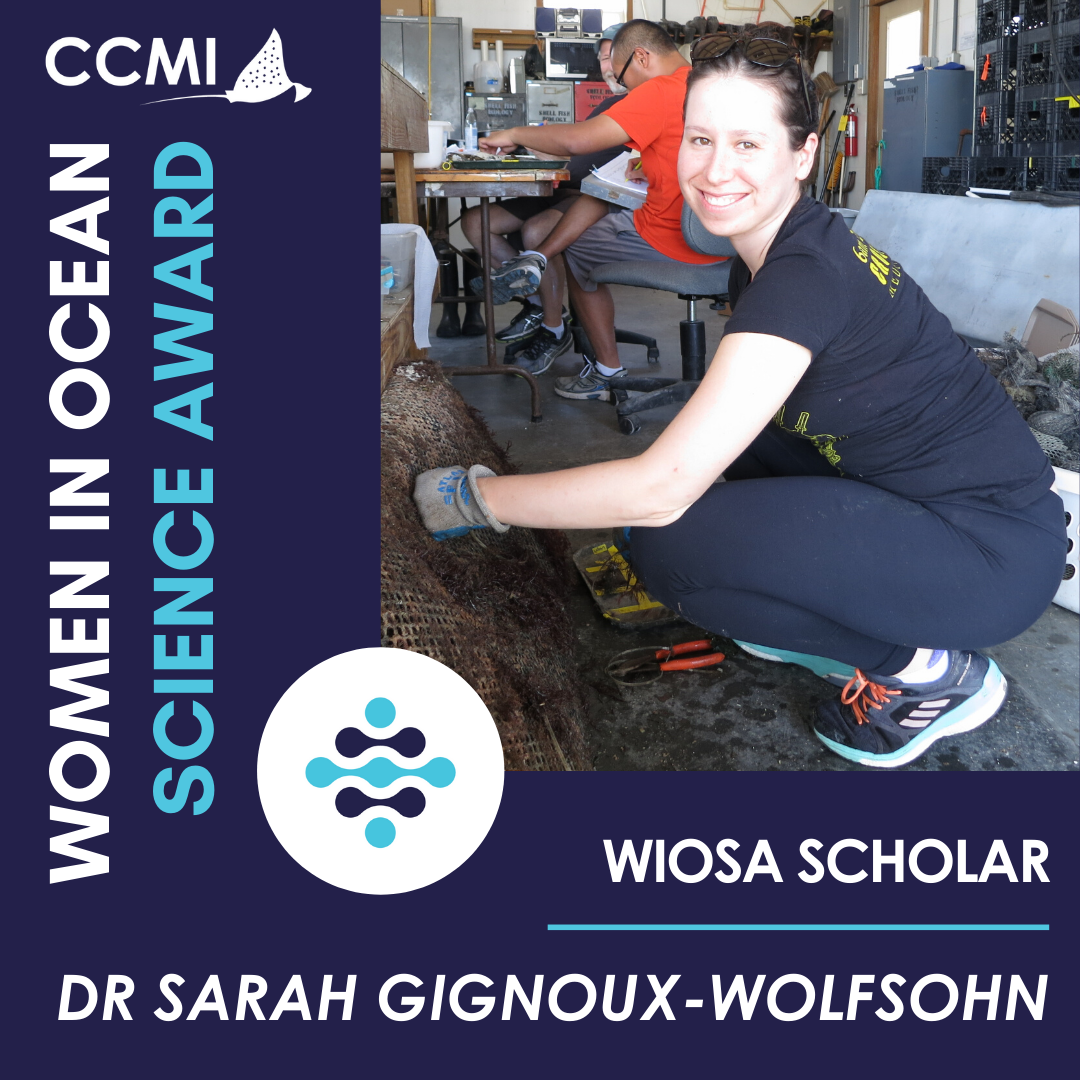CCMI Announces First Women in Ocean Science Award Scholar
The Women in Ocean Science Award (WIOSA) seeks to recognize outstanding early-career and mid-career scholars who are advancing the frontiers of marine science and are becoming world-leading professionals. The WIOSA Advisory Council is pleased to announce the first WIOSA scholar, Dr. Sarah Gignoux-Wolfsohn, who is studying the effects of bivalve community diversity on the distribution of pathogens and related microbial communities at the Smithsonian Environmental Research Centre.
Dr. Carrie Manfrino, who founded CCMI in 1998 and developed the Little Cayman Research Centre while she was an assistant professor in oceanography in the US, was key to establishing this award in 2019. “Whilst progress has been made over the last 30 years in terms of women’s representation within the scientific community, the discipline of ocean science remains hugely unequal in terms of women entering at professional levels vs their progression to key positions within academia. WIOSA seeks to create a network and mentorship for researchers and interns who will collectively help find solutions to some of the greatest questions facing the ocean and our society today. What was remarkable in the applications was that many of the challenges I had 30 years ago when I was a graduate student and over the last 25 years as a professional have unfortunately not changed.”
Dr. Gignoux-Wolfsohn’s winning application, which was selected by the WIOSA panel that includes Dr. Carrie Manfrino, Dr. Sylvia Earle, Dr. Amy Apprill, Dr. Christine Ferrier-Pages, Dr. Gretchen Goodbody-Gringley and Dr. Hollie Putnum, outlined a project to examine the effects of coral reef community diversity on coral health. Dr. Gignoux-Wolfsohn, as the first WIOSA scholar, has set a high bar.
She said, “I am very excited to be the first recipient of the WIOSA. I am honoured to have been chosen by the amazing scientists at CCMI and WIOSA advisors. I am looking forward to contributing to the amazing woman-led research programmes at CCMI and to help mentor the next generation of female scientists. This award will greatly advance my research programme, integrating theory and ideas from other systems with my PhD work on coral health and disease. Infectious disease is one of the greatest threats to corals and the coral reef ecosystems they build. By testing methods to improve the resilience of coral communities, my work at CCMI will advance our understanding of community ecology, disease, and microbial community composition with implications for coral restoration and the creation of resilient coral reefs.”
Dr. Gignoux-Wolfsohn was chosen for the WIOSA Scholarship through a competitive application process that included applicants from more than 10 countries and some of the best research labs in the world. Dr. Gretchen Goodbody-Gringley, Director of Research and Distinguished Scientist at CCMI, has been impressed by the range and calibre of applicants, resulting in Dr. Gignoux-Wolfsohn being identified as the wining scholar stating, “We are thrilled to be giving the first WIOSA Scholar to Dr. Gignoux-Wolfsohn. She is a shining example of productivity in the face of hardship; with an excellent publication record and strong determination, she is sure to become a leader in ocean science. Her focus on coral disease transmission is timely and relevant, and it perfectly complements the current research programmes at CCMI. We are excited to begin a long-lasting collaboration with her.”
The WIOSA internships will also soon be announced, with an equally impressive number of excellent applications currently being assessed by the panel. CCMI would like to thank the Brian Melito and Jessica Colker Trust for supporting this programme.
WIOSA supports the advancement of women in ocean sciences, so participants can become world-leading professionals. By establishing a network and providing mentorship, funding, and field access for a cohort of WIOSA coming through the ranks, this programme seeks to push the frontiers of science and to support a generation of leading women ocean scientists who want to work on crucial topics related to coral reefs and tropical ecosystems. The WIOSA programme will directly impact researchers and interns who will collectively help find solutions to some of the greatest questions facing the ocean and our society today. WIOSA is made possible by the support from the Brian Melito and Jessica Colker Trust.
WIOSA Scholar Details
One WIOSA Scholar was identified by March 2020 (application deadline was 28th February 2020). The WIOSA Scholar will have full resources to establish a new field research experiment on the topic of coral reef/ocean resiliency over a two-year period, based at the Little Cayman Research Centre. A $10,000 USD financial fellowship award will be granted to the scholar, per annum. A further $10,000 USD per annum will be awarded to support a full month of field research activity (diving, boat, transportation, room and board, equipment) at the Little Cayman Research Station as well as participation in a relevant international scientific conference. A field budget must be submitted for approval by 15 April. The scholar will have the ability to select their interns (see below), via a fair and transparent process. This award is open to everyone, there are no geographical restrictions.
ABOUT CCMI
CCMI is a not-for-profit organization founded in 1998 to protect the future of coral reefs, envisioning a world with vibrant oceans and healthy coral reef ecosystems. We seek to be the Caribbean’s premier marine research institute by delivering cutting edge research, transforming conservation strategy and developing education programmes of excellence – discovering and promoting real solutions to declining ocean health. Our plan is to invigorate key species and understand key ocean processes that drive reef resilience. We support early career scientists who are INNOVATING ways to improve coral reef health. We are TRANSFORMING conservation strategy and work to inspire the CHANGE that is needed to achieve our mission. CCMI are PIONEERS in the region working to reverse the declines of coral reefs.
BACK
 CONTACT
CONTACT gallery
gallery facebook
facebook instagram
instagram youtube
youtube twitter
twitter